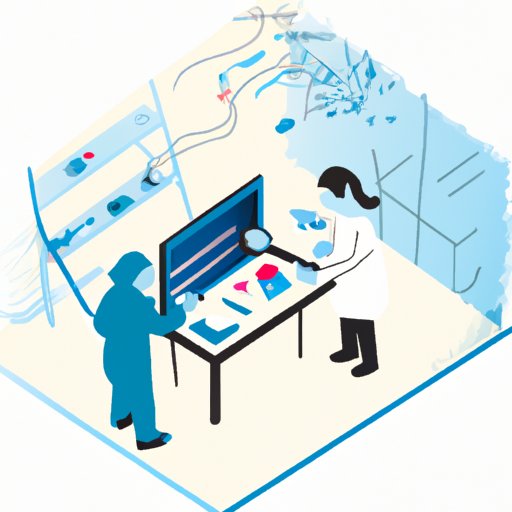Introduction
Forensic science is an important tool that helps to solve crimes and provide evidence for criminal proceedings. It relies on a range of techniques and processes to uncover information about a crime scene and the perpetrators involved. One of these processes is known as experimental design, which plays an essential role in forensic investigations. In this article, we explore how experimental design informs forensic science and the impact it has on crime scene investigations.

Exploring the Role of Experimental Design in Forensic Science
Experimental design is the process of designing experiments to test hypotheses or answer specific questions. It involves the systematic planning and implementation of experiments in order to obtain valid data and results. This process is used in many scientific disciplines, including forensic science.
In forensic science, experimental design is used to examine evidence and determine the cause of a crime. It involves the careful selection and analysis of evidence, as well as the formulation of hypotheses that can be tested. The goal of experimental design is to provide reliable and accurate results that can be used to support or refute claims made by investigators.
Experimental design is important in crime scene investigations because it allows investigators to identify and analyze evidence more effectively. It also helps to reduce errors in data interpretation and evidence collection. By using this process, investigators are able to gain a better understanding of a crime scene and the events that took place there.

Analysing the Impact of Experimental Design on Forensic Investigations
Experimental design can improve the accuracy and speed of forensic investigations. By carefully planning and executing experiments, investigators are able to obtain more reliable data and results. This can help them to draw more accurate conclusions about a crime scene and the perpetrators involved. Additionally, the use of experimental design can reduce the amount of time needed to conduct an investigation, as the data collected is more likely to be valid and relevant.
The use of experimental design in forensic investigations also has implications for data interpretation and evidence collection. By following a systematic approach to experimentation, investigators are able to gather more meaningful evidence and interpret it accurately. This can have a significant impact on the quality of evidence presented in court, as it is more likely to be reliable and useful.
Examining the Utility of Experimental Design in Crime Scene Investigations
It is important to evaluate the effectiveness of experimental design in providing reliable results. Studies have shown that this process can improve the accuracy and speed of investigations, as well as reduce errors in data interpretation and evidence collection. Additionally, experimental design can help investigators to draw more accurate conclusions about a crime scene and the perpetrators involved.
However, there are some limitations to using experimental design in crime scene investigations. One of the main drawbacks is that it requires a great deal of time and effort to plan and execute experiments. Additionally, the results obtained may not always be reliable or applicable to the particular case being investigated.
Investigating the Benefits of Using Experimental Design in Forensic Analysis
Using experimental design in forensic analysis can bring a number of benefits. Firstly, it can improve the accuracy of the data obtained, as experiments are carefully planned and executed. This can lead to more reliable results that can be used to draw more accurate conclusions about a crime scene and the perpetrators involved. Secondly, the use of experimental design can increase the efficiency of forensic analysis, as the results obtained are more likely to be valid and relevant.
Additionally, experimental design can help to reduce errors in forensic analysis. By carefully planning and executing experiments, investigators are able to obtain more accurate data and results. This can lead to fewer mistakes in the interpretation of evidence and the presentation of evidence in court.

Understanding the Significance of Experimental Design in Forensic Science
Experimental design plays an important role in forensic science, as it helps to improve the accuracy and speed of investigations. It also has implications for data interpretation and evidence collection, as it can help to reduce errors in forensic analysis. Finally, the use of experimental design can have a significant impact on the quality of evidence presented in court, as it is more likely to be reliable and useful.
Overall, experimental design is an essential tool in forensic science. It enables investigators to obtain more reliable results and draw more accurate conclusions about a crime scene and the perpetrators involved. By using this process, investigators are able to gain a better understanding of a crime scene and the events that took place there.
Conclusion
In conclusion, experimental design is an important process in forensic science. It enables investigators to obtain more reliable results and draw more accurate conclusions about a crime scene and the perpetrators involved. Additionally, the use of experimental design can improve the accuracy and speed of investigations, as well as reduce errors in data interpretation and evidence collection. As such, it is an essential tool in crime scene investigations and forensic analysis.
(Note: Is this article not meeting your expectations? Do you have knowledge or insights to share? Unlock new opportunities and expand your reach by joining our authors team. Click Registration to join us and share your expertise with our readers.)
